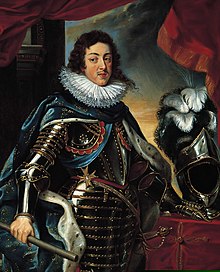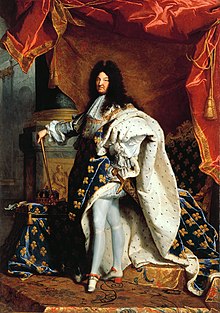Absolute monarchy in France
This articleneeds additional citations forverification.(January 2020) |

Absolute monarchy in Franceslowly emerged in the 16th century and became firmly established during the 17th century.Absolute monarchyis a variation of the governmental form ofmonarchyin which the monarch holds supreme authority and where that authority is not restricted by any written laws, legislature, or customs. InFrance,Louis XIVwas the most famous exemplar of absolute monarchy, with his court central to French political and cultural life during his reign. It ended in May 1789, when widespread social distress led to theconvocationof theEstates-General,which was converted into aNational Assemblyin June. The Assembly passed a series of radical measures, including theabolition of feudalism,state control of theCatholic Churchand extending the right to vote.
Introduction[edit]
The 16th century was strongly influenced by religious conflicts[1]that developed out of theReformation.France's precarious position created ideal conditions for the formation and justification of absolute monarchy. Its disputes between monarchy and community as well as the fatal loss of theHouse of Valois'[2]authority during the second half of the 16th century prompted theoretical reflections that led to the consolidation of the monarchy's power.
Establishment[edit]
By the early 9th century, the efficient administration ofCharlemagne'sEmpirewas ensured by high-level civil servants, carrying the, then non-hereditary, titles ofcounts(in charge of a County),marquis(in charge of aMarch),dukes(military commanders), etc. During the course of the 9th and 10th centuries, continually threatened byViking invasions,France became a very decentralised state: the nobility's titles and lands became hereditary, and the authority of the king became more religious than secular and thus was less effective and constantly challenged by powerful noblemen. Thus was establishedfeudalismin France. Over time, some of the king's vassals would grow so powerful that they often posed a threat to the king.
Since then, French kings had continuously tried to strengthen existing royal powers scattered among their nobles.Philip the Fair,Charles the WiseandLouis the Cunningwere instrumental in the transformation of France from a feudal state to a modern country. By the time ofFrancis I,France was a very centralized state but theFrench Wars of Religionposed a new threat to royal absolutism with quasi-independentProtestantstrongholds developing in various locations in the country.
With his skillful Prime MinisterRichelieu,who vowed "to make the royal power supreme in France and France supreme in Europe." (source: Cardinal Richelieu's Political Testament),Louis XIIIestablished Absolute Monarchy in France during his reign. When his son and successorLouis XIVcame to power, a period of trouble known as theFrondeoccurred in France, taking advantage of Louis XIV's minority. This rebellion was driven by the great feudal lords and sovereign courts as a reaction to the rise of royal power in France.
The rebellion was crushed; however, many obstacles stood in the way of absolutism in France:
- Nobleshad the means to raise private armies and buildfortifications.The king did not have the means to raise and keep an army himself and had to rely on these nobles to defend the nation;
- Lesser nobles, who had the ability to read and write, also acted as the king's agents. Effectively, they were his representatives of government to the people. They collected taxes, posted edicts, and administered justice.
- TheHuguenots,who since the 1598Edict of NantesbyHenry IV,held therights to bear armsand to build fortifications in certain locations.

To overcome these obstacles King Louis XIV adopted several measures to weaken or eliminate competing centers of power:
TheEdict of Fontainebleauin 1685 removed the former policy of tolerance toward French Huguenots, as formalised by theEdict of Nantes
A more subtle tactic was the demolition of a number of fortified castles still owned and occupied by members of the nobility. This Edict of 1626 was justified as a budgetary reform to reduce maintenance costs by removing obsolete fortifications within the borders of France. While a rational economic step in itself, this measure did have the additional effect of undermining the independence of the aristocracy.
Louis XIV reduced the nobles' power further by requiring them to spend at least some portion of the year as courtiers in residence at thePalace of Versailles.At Versailles, the aristocracy were removed from their provincial power centers and came under the surveillance and control of the royal government. Rather than seen as demeaning, the nobles took required membership of the royal court to be a high honor. Nobles, being granted residence at Versailles, were generally prepared to give up their former duties as royal representatives outside Paris. Louis XIV, with the help of hisminister of finance,Jean-Baptiste Colbert,replaced them with royal appointees drawn largely from themerchant class,who were generally better educated and whose titles were revocable and not hereditary.
Limits to power[edit]
The absolute monarchy was not the same astotalitarian dictatorship,and there were limits to the king's power. Known as the "fundamental laws of the Kingdom",these evolved over time and were aset of unwritten principleswhich placed limits on the otherwise absolute power of the king from the Middle Ages until theFrench Revolutionin 1789. They were based on customary usage and religious beliefs about the roles of God, monarch, and subjects.[3]
Consequences[edit]
This section has multiple issues.Please helpimprove itor discuss these issues on thetalk page.(Learn how and when to remove these template messages)
|
The final outcome of these acts did centralize the authority of France behind the king. The replacement of government ministers, removal of castles, and other financial policies of Colbert did reduce French national debt considerably.
In the 18th century, however, the relocation of nobles and the sheer obsolescence of Versailles became an important place for a rising merchant class and an instigative press.
Perhaps the most pressing consequence of absolutism in France is the emigration of theHuguenots.Of the merchant class, their emigration effectively led to abrain drainand a loss of tax revenue for France. Moreover, barred fromNew France,they immigrated to other nations, most notably theThirteen Colonies,taking their skills ofprinting,glass making,carpentry,ceramics,a deep belief in the needs forfreedom of religion(at least forProtestantism), and theright to bear arms.
The other consequence was a large reduction of the dominating influence of the Kingdom of France in Europe, and a rise in the power of other kingdoms to strengthen their empire, notably in Great Britain, Spain, and the Holy Roman Empire. This caused numerous deadly wars with them (in Europe, America and Africa), some of them won by France or its allies (notably for the independence of the United States), but this caused the loss of most parts of New France (most continental parts in North America, including those that would be sold later to the United States after the end of monarchy in France by the First French Empire, and some islands in the Caribbean), severe degradation of the economic advantage of the first French colonial Empire, accumulation of debts in the kingdom (with a growing influence of the merchants against the French nobility), and a considerable loss of economic, diplomatic, political and cultural influence in Europe, all these being left to the growing British colonial empire (even after its loss of New England) and to its allies all around France in Spain (including the Spanish Netherlands), Austria (including Italy), Nordic countries (and later the United States).
Another consequence of the creation of the United States and of the costly wars between France and all its neighbours in Europe, was also that it initiated lot of severe political and social troubles throughout the kingdom, and it paved the way to the French Revolution and finally the end of the absolute monarchy, via a short step of constitutional monarchy (restoring some parliamentary powers to theEstates General) between 1789 and 1791, and then to the First French Republic (during which the eviction of the traditional French clergy and nobility from the new Constitution further strengthened the military alliance of all European neighbours against France). That lost influence of France was never restored in the following centuries, even after the emergence of the First French Empire (which terminated the dictature, reunited a strongly divided France, restored the freedom of religion, and allowed the reemergence of a stable commercial sector, but also initiated new wars against other monarchies in continental Europe), or after the formation of a new French colonial empire by the Third Republic.
Even today's Fifth Republic in France mimics some models from other European constitutional monarchies, because of the stability and influence of the head of state (monarch or elected president) to preserve the territorial unity by an enforced balance of powers. Unlike past republics, it even accepts and protects constitutionally the presence of nobility, religions or diverse cultures, as plain components and (non absolute) actors of the republic, even if it promotes its own unified system, freely accessible to all its nationals or applicable directly only to its foreign residents.
See also[edit]
References[edit]
- ^"Sixteenth Century".Lepg.org.Retrieved2012-10-19.
- ^"France History, The Valois Dynasty 1358-1589".Bonjourlafrance. Archived fromthe originalon 2015-09-23.Retrieved2012-10-19.
- ^Dignat, Alban (27 May 2021). Grégor, Isabelle (ed.)."XVIIe siècle: Absolutisme et monarchie en France"[17th century: Absolutism and Monarchy in France].Herodote.net(in French). Herodote.net SAS.Retrieved6 July2023.
